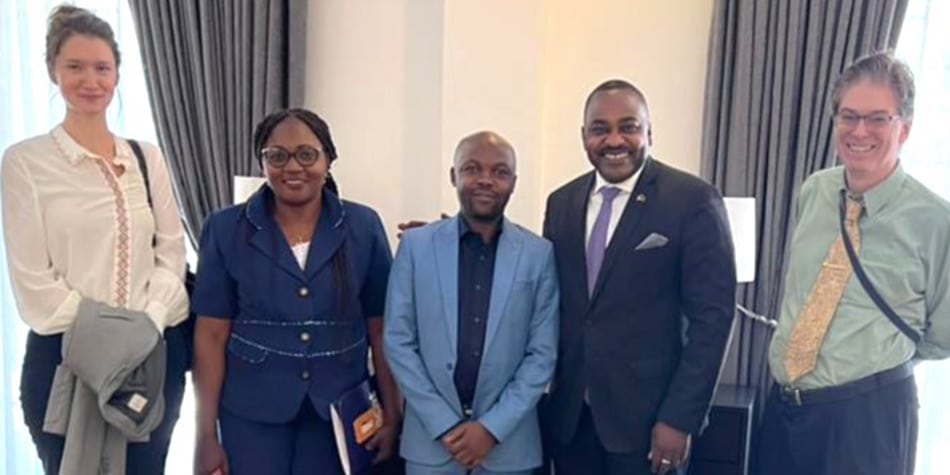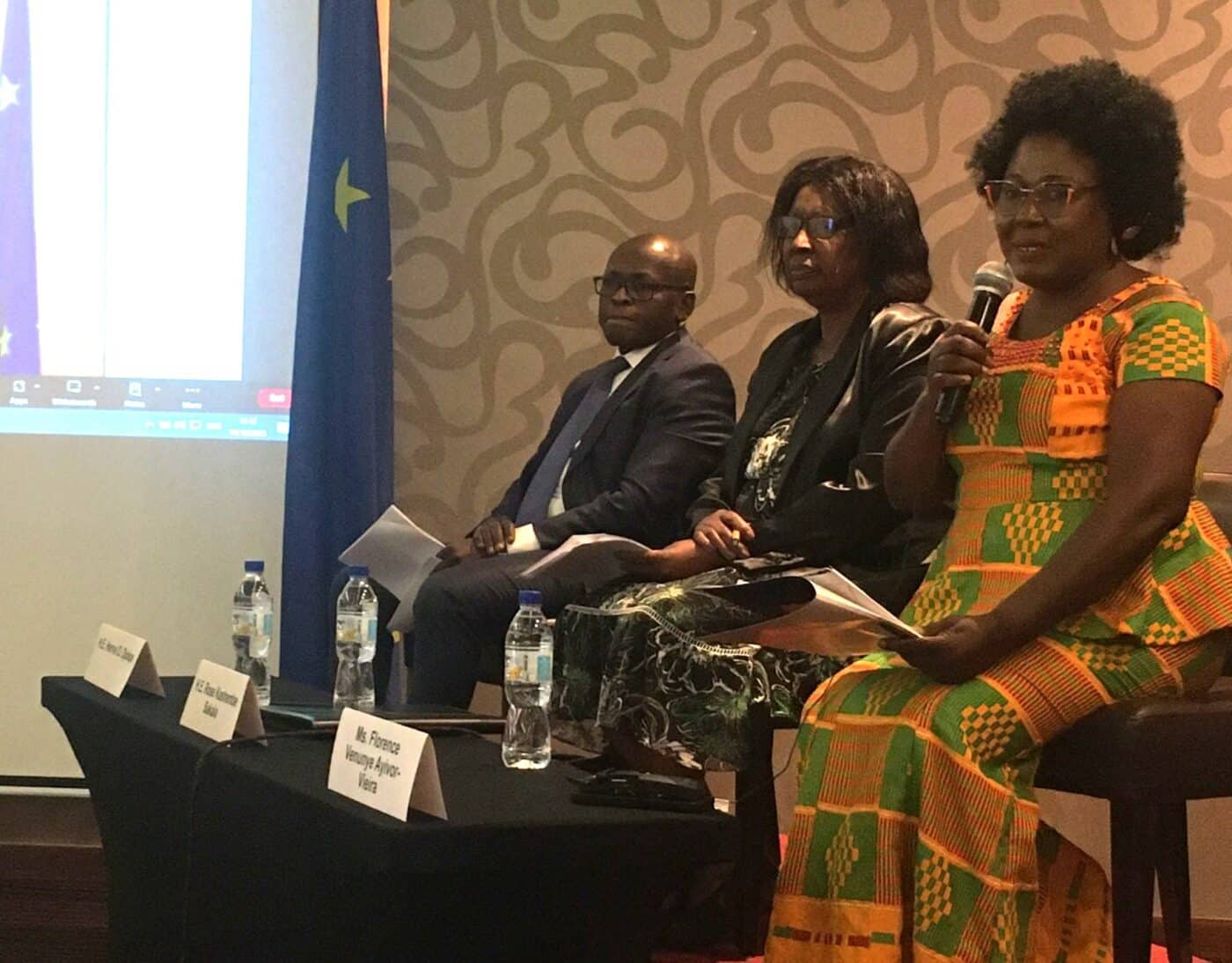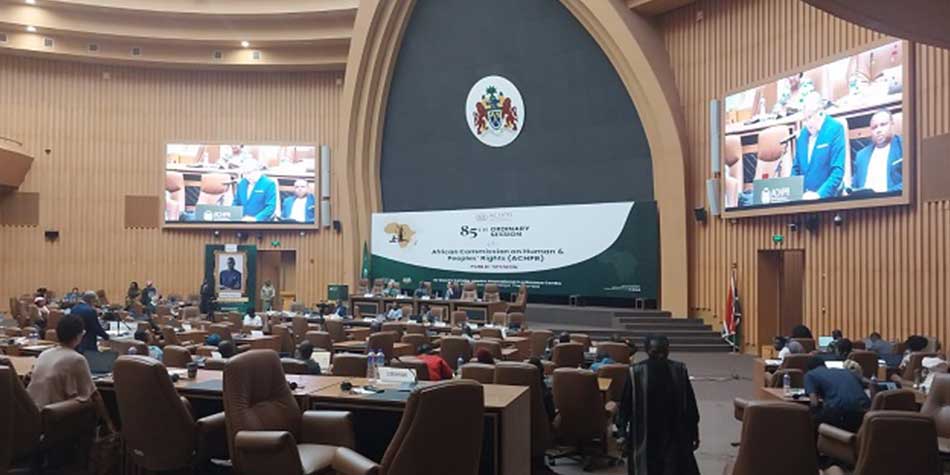
Advocating for the Adoption of the Draft Protocol by the African Union: A Step in the Right Direction for Abolition in Africa
Africa
Advocacy in Addis-Ababa
On the 10 October 2023, the FIACAT (International Federation of ACATs), and the World Coalition Against the Death Penalty, represented by Ms. Florence Ayivor-Vieira of ACAT-Ghana and Mr. Hervé Nsabimana of CODHAS (Centre d’observation des Droits de l’Homme et d’Assistance Sociale), Co-Chairpersons of the World Coalition’s working group on the draft protocol were in met in Addis-Ababa, Ethiopia.
Also present were expert members of the African Commission on Human and People’s Rights (ACHPR) Working Group on Death Penalty, Extra-Judicial, Summary or Arbitrary Killings and Enforced Disappearances in Africa to support the draft optional protocol to the African Charter on Human and Peoples’ Rights on the abolition of the death penalty.
Coinciding with the World Day Against the Death Penalty, the ACHPR and the European-Union co-hosted a panel to discuss the advances in abolition on the African continent and the progress left to be made. The panel was opened by H.E.M Eamon Gilmore (EU Special Representative for Human Rights), Dr. Ikubaje John Gbodi speaking on behalf of the Commissioner for Political Affairs, Peace and Security to the African Union (AU) Commission, as well as Commissioner Idrissa Sow, President of the ACHPR Working Group on the death penalty. Moderated by Ms. Florence Ayivor-Vieira, ACAT-Ghana, the panel brought together speakers from national delegations to the AU and Ethiopia (H.E.M. Herve Djokpe, Ambassador of Benin, H.E.M. Rose Kashembe Sakala, Ambassador of Zambia, and H.E.M Manuel Salazar , Ambassador of Spain), as well as from the ACHPR (Mr. Julien Ngane Ndour, expert member to the ACHPR’s Working Group on the death penalty) and civil society (Mr. Paul Angaman, President of the FIACAT).
The panel discussions presented the many advancements seen in recent years on the African continent, with the Ambassadors from Benin and Zambia presenting their own countries as abolitionist case studies. However, a primary focus of discussion was on the draft additional protocol to continue to raise awareness and generate enthusiasm for this text. The rest of the week following the panel included bilateral meetings with interested actors and permanent representatives to AU to start drumming up support as the draft protocol text is reintroduced to the African Union to hopefully start technical negotiations in 2024.

In addition, a first meeting of champion states or “Friends of the Draft Protocol” took place at the Côte d’Ivoire Embassy at the invitation of the Francophonie representation (OIF). The meeting was attended by the ambassadors of French-speaking countries, extended to the various diplomatic missions, and included the representative of FIACAT, the World Coalition and the Chairperson of the ACHPR working group. The main aim of the meeting was to begin identifying the interest of African states in the AU, to find out who would be prepared to support this draft protocol. The group of friends of the draft protocol pledged to create a framework for exchange between ambassadors to ensure that the process of adopting the draft protocol moves forward smoothly. States in favor of the protocol that are not members of the African Union were also involved in the advocacy to support the adoption of the protocol as allies at neutral levels.
Why the Need for an Optional Protocol to the African Charter?
The United Nations and many other international organizations have advocated for the abolition of the death penalty due to its potential violation of basic human rights. Indeed, the theme for the 52nd session of the United Nations Human Rights Council and the biennial High Council on Penal Issues held on 28 February, 2023, by the Office of the United Nations High Commissioner for Human Rights (OHCHR), was ‘human rights violations’ with its main focus on the abolition of the use of the death penalty.
The AU, with its core mandate to promote peace, security, and human rights, also sees abolition of the death penalty as a priority and has worked hard to make some gains since its inception. In recent times, the AU has considered the revision and adoption of its draft protocol on the abolition of the death penalty important to reflect growing international standards and promote the protection of human rights.
In the conclusion of its 2011 study on the question of the death penalty in Africa, the ACHPR recommended as follows: “To the African Union and to State Parties, the adoption of a Protocol to the African Charter on Human and Peoples’ Rights on the Abolition of the Death Penalty in Africa under any circumstances [to] fill the gap in the African Charter with a stronger emphasis on restorative rather than on retributive justice.”
While 27 African countries have abolished the death penalty as of December 2023, others still use it for crimes such as murder, terrorism, and drug trafficking. Apart from the violation of human rights and the inhumane nature of the death penalty, the application of the death penalty is arguably irreversible, and once a person is executed, there is no way to correct a wrongful conviction. Research also has it that some victims were found to be innocent after execution, while others were victims of circumstances such as self-difference and political activities.
A lack of enforced systems, like inadequate legal representation, limited access to forensic evidence, and corruption, remains a challenge in Africa, and by adopting the anti-death penalty draft protocol, the AU can encourage the reduction of the risk of executing innocent people, with an eye to stopping it entirely.
Ratifying and adopting the draft protocol will also enable the AU to reaffirm its commitment to its core mandate to promote peace, security, and human rights and prevent miscarriages of justice. The adoption will also act as a binding force on member countries, promoting regional cooperation, collaboration and ensuring consistency in the application of the protocol. Alternative punishments to the death penalty are, however, to be worked out by the AU to match the global direction.
The AU does not have legally binding laws for its members to abolish the death penalty, and therefore it is not enough to call on member states that ended the death penalty to announce it and reaffirm their commitment to it. The African Union can, however, take advantage of the legal dispositions of member countries, changes in leadership, public opinion, diplomacy, and international pressure to push for abolition in member countries that have yet to abolish the death penalty. Several efforts have been made in recent times to help the AU adopt the draft protocol, which has been idle since its first introduction to the AU in 2015.
The FIACAT and the World Coalition held a meeting on July 2023, with 39 of its members to initiate the process for the reading, revision, and adoption of the protocol by the African Union. The meeting reviewed the advocacy for the adoption of the draft Death Penalty Protocol and started to identify areas of action to push for the completion of the adoption process.
Advocating for the adoption of the death penalty by the African Union is a step in the right direction.
Photograph Copyright: World Coalition Against the Death Penalty
Categories
Trend Towards Abolition






